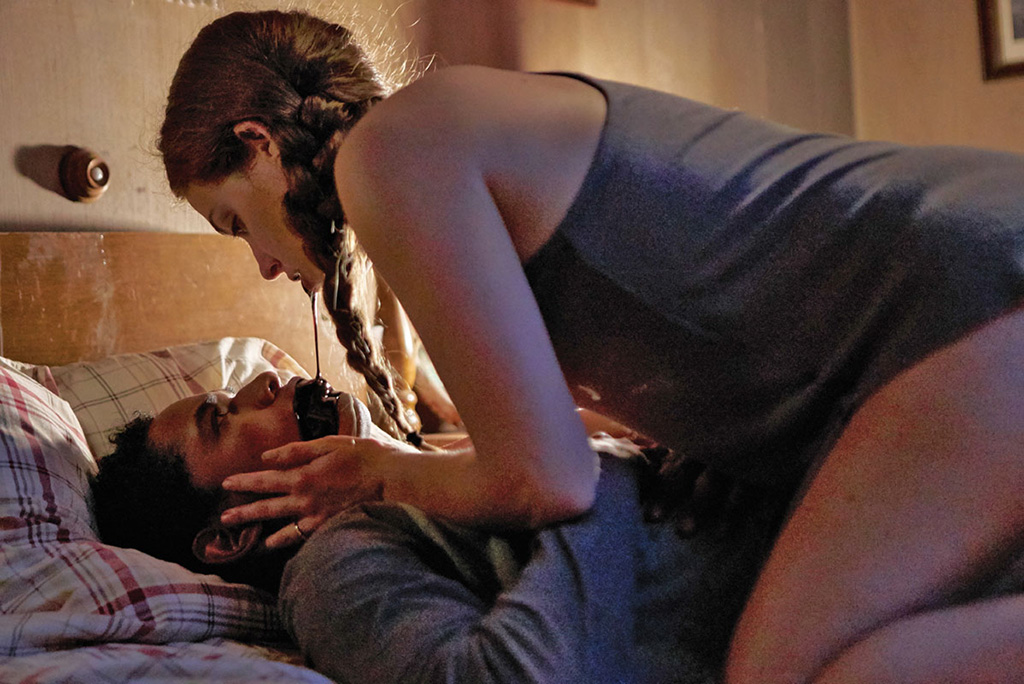Review: “It Comes At Night” builds tension without any payoff
A family fends off a deadly menace in a slow-paced thriller that quickly gets lost in the woods

Hyped as one of this summer’s most anticipated fright flicks, It Comes At Night might have to settle instead for being this year’s second-best Shyamalan-style thriller. More likely, the film will earn the title of 2017’s most divisive horror movie. Its cryptic atmosphere-over-incident approach to the post-apocalyptic virus genre, and boldly bleak (or just bleak) climax, are sure to leave some viewers dissatisfied.
Trey Edward Shults’ followup to his award-winning debut feature drama Krisha, the film achieves stretches of unrelenting tension and discomfort. Then it rinses and repeats those patterns, while escalating fitfully to a point of blunt misery.
It Comes at Night (★★½) places families — both biological and makeshift — at its center. And, like many effective horrors, it generates potent chills from what the audience doesn’t see. Where the film falters is in its pacing of the tale, and in how it completes the tense build-up of its premise.
Joel Edgerton (Loving) stars as Paul, a father desperate to keep his family safe from a mysterious, insidious sickness that’s decimated the world beyond their remote cabin in the woods. He and his wife, Sarah (Carmen Ejogo), and their sensitive teen son Travis (Kelvin Harrison, Jr.) have settled into a post-traumatic, stress-ridden version of normal that calls for keeping all the doors bolted, the windows boarded up, and never stepping outside after dark.
The film only alludes to the horrors the family might have faced to have maintained their peaceful sanctuary. But they’ve devised rules to preserve their safe space, and Paul maintains those rules with a keen eye, a fair heart, and a tough hand that never strays far from his rifle.
Conveying Paul’s abiding love for Sarah and Travis, as well as his cunning and decisiveness, Edgerton is quick on his feet and utterly convincing. He’s intensely watchful when the family’s bubble of security is infiltrated by a handsome stranger named Will (Christopher Abbott), who claims he also is a father desperate to save his family.
Paul and Sarah agree to allow Will and his wife Kim (Riley Keough) to move in with their young son, Andrew (Griffin Robert Faulkner). From that point, the two families work to forge a dynamic of trust and cooperation. In a world where exposure to the sickness leads inexorably to death, and any stranger might pose the danger of infection or of fatal deception, trust does not come easily. While the promise of a stronger combined familial unit initially draws the unexpected housemates closer, the reality is that everyone’s nerves are shot, resources are painfully limited, and no one knows for sure what monsters — human or otherwise — lurk in the woods.
The film thoughtfully explores the idea of a community borne of necessity, while offering a raw glimpse at family bonds under fire, harshly tested by life-or-death adversity. By casting Paul, Sarah, and Travis as an interracial family, forced by circumstances to work with their new neighbors, Shults also sketches an insightful portrait of diverse Americans galvanized by their shared hopes for survival, peace, and prosperity. It feels sad and true that distrust and paranoia, as much as any actual contagion, jeopardize the peaceful balance in the house.

Travis’ burgeoning sexual attraction to Kim also complicates the new normal. Unfortunately, despite Keough’s endearing performance, and the sharp edge of taboo attraction between her and Travis, there’s no substantial payoff to their perilous dance. There is some satisfaction to be gained simply from the film’s tactic of setting strangers loose in a dark cabin in the woods. Lingering silences and seemingly empty, shadowy spaces are used to appropriately disquieting effect.
As Travis, Harrison is marvelously expressive in a role that often dictates the film’s perspective. His sense of fear and curiosity, and alternating courage and timidity, supply driving energy to a narrative that winds its twists and turns only in the most deliberate fashion. Tension mounts, and just nearly snaps.
But too often in It Comes at Night, no genuine shocks or cathartic release wait at the end of each taut thread. Instead, it’s just deeper and deeper mystery. Lantern light pierces the pitch black night onscreen, but the story remains shrouded in darkness.
It Comes at Night is rated PG-13 and opens in theaters everywhere on Friday, June 9. Visit Fandango.com.
Support Metro Weekly’s Journalism
These are challenging times for news organizations. And yet it’s crucial we stay active and provide vital resources and information to both our local readers and the world. So won’t you please take a moment and consider supporting Metro Weekly with a membership? For as little as $5 a month, you can help ensure Metro Weekly magazine and MetroWeekly.com remain free, viable resources as we provide the best, most diverse, culturally-resonant LGBTQ coverage in both the D.C. region and around the world. Memberships come with exclusive perks and discounts, your own personal digital delivery of each week’s magazine (and an archive), access to our Member's Lounge when it launches this fall, and exclusive members-only items like Metro Weekly Membership Mugs and Tote Bags! Check out all our membership levels here and please join us today!





















